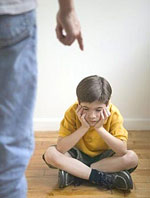To beat or not to beat?

The problem of physical punishment of children divided the parents into opponents and defenders of this measure of punishment. To beat or not to beat the child?
How it is possible to bring up the child in a different way, manyparents often simply do not represent. His childhood memories, the authoritative grumbling of grandmothers that the strap of the child has been weeping about the child's forehead for a long time - all this makes not even the faith in young parents, but the conviction that it is not only possible to beat a child, but it is also necessary.
In fact, the truth is simple - violence breeds violence. If the child is beaten for the sake of education andobedience, then parents can be sure, the child will very quickly learn - who is stronger, he is right. Is this what they want to impress him with a belt? Any person to strike most likely will want to respond with a blow. A small child realizes that he will not be able to inflict the same physical blow to his parents, but he will beautifully strike back at the nerves of his parents. There are a lot of examples when children were beaten for some kind of "dirty trick", but they persistently continued to do this "dirty trick" - in defiance of parents.
Hence, by the way, supporters of physical punishment have deduced one more "formula": the belt brings up a strong personality in the child. But is it? Education by physical force turns a child into a frightened, nervous person, and not into a full-fledged person!
Supporters of child upbringing withphysical punishment believe that the fear of the child before the pain of physical punishment very quickly teach him what can and can not. For example, if a child bites or fights, the parents believe that a blow or a bite in response will show the child that it also hurts others.
But can physical punishment teach a child "What is good, and what is bad"? Paradoxically, no! At the age of up to 2 years, the child generally can not understand why he was punished. A simple example. If you ask adults, friends or co-workers, whether they were physically punished as children, then surely the majority will answer in the affirmative. And if you ask them, why did they beat them? No one will remember exactly, except that the case was out of the ordinary. So can we talk about the educational nature of this measure of punishment, if remember only pain and resentment, but not "reasonable, kind, eternal", which parents tried to instill in such a method?
Although the majority of parents refused to bring up the parenting, but slap on the pope, many do not consider physical punishment in principle, and most often spank the baby ina fit of anger and irritation. Then they even feel ashamed. But for one child, a slap does not represent anything particularly terrible, but for another it is a real tragedy.
How can you raise a child without applying physical punishment? Unfortunately, a huge number of parentsis unknown. And they continue to spank children on the pope or reward with slaps and slaps just because they do not know how. Meanwhile, education without physical punishment is possible.
The child is beaten, because they are afraid that he will not know the rules and boundaries, he will grow up to be an egoist and a "parasite". But also other ways of punishment allow you to set a frame for the child, for which he will not go out. The child rolled the tantrum in the supermarket? The way out is: calmly warn the child that if he does not stop, the store will have to leave. And in case of disobedience - a threat to fulfill. To deprive the child of pleasures and rewards for offenses is a more "humane" and effective way than physical punishment. In addition, it will be good if the child from early childhood accustom to accountability for their actions. If he hit his mother, then let him know that after that she will stop communicating with him. If you do not eat a bowl of soup for lunch, let him be sure that he will not get anything before dinner ...
When the child brought his parents with antics to"White heat", they find it difficult to resist from slapping a child who has been upset, as they say, from the heart. Count in the mind to ten, switch your attention to something else, leave the room or lead to another room of the child - this can help the parent to restrain the first outburst of anger and more soberly look at the situation. When the cause of the child's misconduct is clarified, it is much easier for parents to think about their future behavior and to choose a suitable measure of punishment.














